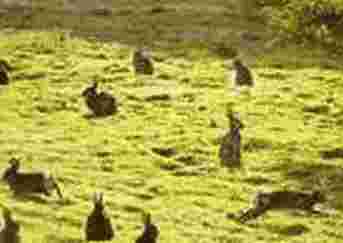Biological Poverty,
humans are just animals.
Human activities over time have cut, and are still cutting, the number of animal and plant species - and have increasingly also excluded them from areas that humans mostly live in. One result of this is human adults and children seeing less and less animal and plant species, and some call this 'people suffering Biological Poverty' - viewed as a part of environment degradation that is of increasing concern to current environmentalism. But that specific type of environment poverty is maybe better called Biotic Poverty.
Poor environment and a lack of other species in it can certainly be a part of poverty, and can also help create general poverty. However animals and plants themselves also tend to over-breeding causing them to suffer general poverty, and humans can do likewise, and this 'over-breeding poverty' is best termed 'Biological Poverty' rather than as some term it 'Malthusian Poverty' which means nothing to many. Human over-breeding encourages over-farming of land which helps cut the number and extent of plant and animal species, so this kind of human Biological Poverty helps worsen the environment's Biotic Poverty as well as other environment poverty. But here we want to chiefly look at human over-breeding or over-population as one major cause of general human poverty.
Thomas Malthus (1766-1834) noted that scientists had found that wild plant and animal populations quickly increase if their food supply increases, due to both increased birth rates and decreased death rates. In this way plant and animal species breed themselves poor and only the fittest will survive - and this powers 'natural selection' of the 'fittest' which enables evolution. So wild plant and animal populations grow easily and follow the Malthus law of biological poverty, driving biological progress for plants and animals so that poverty is good for progress ! And controversially Malthus claimed that this applies to humans also.
An Essay on the Principle of Population, Chapter 1 (Malthus 1798) ;
"Through the animal and vegetable kingdoms, nature has scattered the seeds of life abroad with the most profuse and liberal hand. She has been comparatively sparing in the room and the nourishment necessary to rear them. The germs of existence contained in this spot of earth, with ample food, and ample room to expand in, would fill millions of worlds in the course of a few thousand years. Necessity, that imperious all pervading law of nature, restrains them within the prescribed bounds. The race of plants and the race of animals shrink under this great restrictive law. And the race of man cannot, by any efforts of reason, escape from it. Among plants and animals its effects are waste of seed, sickness, and premature death. Among mankind, misery and vice. The former, misery, is an absolutely necessary consequence of it."
Malthus claimed that, like wild plants and animals, human populations also always follow this law of biological poverty and breed themselves poor. And certainly in primitive societies it is often the case that increased food supply does give a population increase, and a decreased food supply does give a population decrease, so that primitive human societies do seem to breed themselves poor in line with the Malthus law of biological poverty.
However, Malthus failed to notice that domesticated plant and animal populations instead follow human wishes and planning, so cow populations do not follow natural food supply biologically and they mostly escape poverty. For humans, Malthus biological poverty can only apply with certainty to societies that have little understanding of conception, because humans who do understand how babies are made can make choices that change birth rates. And humans can of course also make choices affecting death rates, even in primitive societies.
Hence though some human societies can indeed suffer Malthus biological poverty, including many poor countries today, this does not always apply to human societies. Not only is there little evidence of more modern human evolution or progress being chiefly constrained by poverty, but there is strong evidence of more modern human civilisations progressing chiefly on the basis of excess wealth - so that universal poverty at least can certainly dampen progress though its necessity may somewhat encourage invention !
# While progress has certainly enabled the world generally to support some population increase better than Malthus envisioned, the existence of famine and hunger in the past and still today in many regions has involved excessive populations for that region and time. Some poor countries need moderate financial encouragement of smaller families, as by a child welfare payment for one or two children that does not rise for more children though this could take some time to work. See
Ending Africa's Poverty Trap, FAO pdf 1.5 mb
 Biological over-population
Biological over-population
And if you run a website or blog, you are welcome to link to this site.